Yi Xian Camping Music Festival (易县露营音乐节) Part 1 – Travel Troubles (旅行的麻烦) Posted by sasha on Aug 15, 2010 in Uncategorized, Vocabulary
As promised in my last post, here is the ridiculous story of my journey to the Yi Xian Camping Music Festival:
Having been back in Beijing for almost two months, I started to feel like I was trapped in the concrete jungle. With the May Day Holiday (五一节 – wǔ yī jié) approaching, I was craving a respite from the daily grind of city life. While a weekend trip seemed like a good idea (好主意 – hǎo zhǔ yì), I knew from past experiences that traveling (旅行 – lǚ xíng) in China on a Chinese holiday was not exactly a walk in the park. Hell, even on normal days, traveling here almost always entails some trouble (麻烦 – má fan). On holidays, this trouble is only multiplied. To me, it honestly seems like all 1.4 billion people in this country decide to get out of town when they have a holiday (放假 – fàng jià). My bad memories of holiday travel coupled with the fact that there were two music festivals going on in Beijing that weekend – the Strawberry Music Festival (草莓音乐节 – cǎo méi yīn yuè jié) and the Midi Music Festival (迷笛音乐节 – mí dí yīn yuè jié) – it looked as if I was just going to have to wait to escape the city smog.
On Thursday afternoon, while surfing the internet (上网冲浪 – shàng wǎng chōng làng) and researching the bands (乐队 – yuè duì) that would be
playing at both Beijing festivals, I stumbled upon a third, lesser known option for live music that weekend. I only had to see one word in the title to make my decision – camping (露营 – lù yíng). For me, the combination of camping and live music is right up there with spaghetti and meatballs, football and hot wings, and vodka and Kahlua. Plus, I had yet to go on a proper camping trip in China, despite the fact that I’d spent the previous seven summers camping out for music. With the festival starting the next day, there was no time (没有时间 – méi yǒu shí jiān) to properly prepare (准备 – zhǔn bèi) for a weekend long festival. It was clear that we were going to have to wing it with this one.
On Saturday morning, my friend Peter and I both woke up with a hangover (宿醉 – sù zuì) as a result of the previous night’s revelry. Not wanting to face the long day in such a state, we both opted to have a 啤酒 for breakfast, much to the dismay of my girlfriend (女朋友 – nǚ péng yǒu). After calling us both idiots, she motivated us to get a move on and pack our things. With little information online about the festival, we weren’t exactly 100% sure how to get there, but we had a rough idea. Little did we know that the day would turn into an epic journey…
Ill-equipped for a camping festival, we headed to Wal-Mart (沃尔玛 – wò ēr mǎ) in search of camping gear. We were able to find some decent tents (帐篷 – zhàng péng) there, along with some sleeping mats. Next up, we headed to the Beijing Railway Station (北京站 – běi jīng zhàn), as the all-knowing Internet had told us to do so. According to the article we found, trains would be leaving bound for Baoding (保定 – bǎo dìng) every 15 minutes. I expected a massive crowd at the station, but I did not foresee much trouble procuring tickets for this off the beaten path city, especially with trains supposedly running four times an hour. I was wrong. While tickets were available, we were going to have to wait over two hours before we could get on the train. With too much time to sit around the station, and too little time to go back home, we headed down a hutong (胡同 – hú tòng)
alley in search of chuan’r (串 – chuàn) and, of course, beer.
Due to the stares from the locals, it was clear that 老外 were still a rare sight in this particular part of town. We tooka seat outside to enjoy the warm weather that had finally arrived after what seemed like an extra long winter (冬天 – dōng tiān) and loaded up on 串 and 啤酒. After wowwing them with my mediocre Chinese, the locals started to warm up to us, and we actually made some friends. One guy was even nice enough to share his Chinese liquor (白酒 – bái jiǔ) with us. The process of drinking 白酒 deserves its own post and/or video, so I’ll let this nice photo collage sum it up for you for the time being…
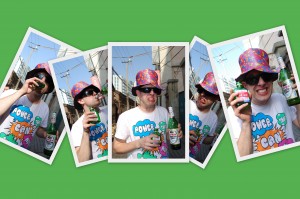
Baijiu sequence… 1. Drink baijiu, 2. Chase with beer, 3. Hate your life, 4. Hate your life even more, 5. Now that wasn’t so bad, was it?
Thanks to the booze, time flew by, and soon enough it was time to head into the train station. To be sure that we’d make our train regardless of troubles, we headed in nice and early. To celebrate the fact that we made it in and that drinking in public is just fine, we grabbed a few more bottles (瓶 – píng) to wait on the train (火车 – huǒ chē).
Aboard the train, we took our seats and settled in for the two-hour ride. In terms of China travel, a two-hour ride is nothing. I have friends who have been stuck standing for 24 hours on a ride from Beijing to Hong Kong, so this ride was a cake walk. The most eventful thing that happened on our ride was Rachel temporarily kidnapping a tiny, incredibly cute Chinese baby (宝宝 – bǎo bǎo).
Arriving in Baoding, we headed out of the station in search of a public bus (公共汽车 – gōng gòng qì chē) to get us to Yi Xian. I had written down the name of the music festival and the place in both characters and pinyin, so I felt pretty confident in our abilities to get there. Of course, by this point, Peter and I were a bit drunk (醉了- zuì le), so the confidence may have been of the liquid variety. At a big bus stop, I asked around to see if anyone knew which bus we needed to board. Nobody knew. Everyone I asked responded with a quick “I don’t know“( 我不知道 – wǒ bù zhī dào). With no help from the locals, we decided to hop on a random bus. After asking around again, we found out this bus was not going to our destination, so we quickly got off. As sunset was drawing near, I gave up on the bus idea and waved down a taxi (出租车 – chū zū chē) and showed him my notepad. He told me he knew where we were going. Success! Not for long, though…
After about 15 minutes, it seemed like our driver was rather confused. I asked him again if he knew where he was going. This time, he admitted that he had no clue where we were going. I kindly asked him to stop the car (停车 – tíng chē), and we hopped out without giving him any money. We had no idea where we were, and no idea how to get where we were going. Rachel was understandably upset, while Peter and I were too delightfully buzzed to really care. With no bus stops or taxis in sight, we waved down a black cab (黑车 – hēi chē) and again showed the driver my notepad. Again, we were assured that the driver knew where he was going. Unlike most black cabs, this guy actually had a meter (计程表 – jì chéng biǎo) in his car, so we weren’t too worried about getting ripped off.
It was now dark, and we had put our faith in this random guy to get us to our destination. I wasn’t exactly sure how far Yi Xian was from Baoding, but I knew it wasn’t more than an hour or so away by bus, so when we had been in the car for for about 75 minutes with no sign of stopping, I got a bit worried. After arguing with the driver for a bit, he finally admitted he really had no idea where we were going. We both got out our cellphones (手机 – shǒu jī) and began calling friends asking for help. My friends in Beijing advised us to give up and ask for a ride back to the big city; at least our driver would know how to get there. Our driver, however, convinced us that his friend gave him proper directions, so we powered on.
About 30 minutes later, we finally saw some signs of life outside our windows, which excited us and our driver. We were excited because we thought we were getting closer. Our driver was excited because he could pull over and ask for directions. Obviously, he still didn’t know where he was going. Fed up and hungry (饿 – È), we decided to give up on this guy. His meter read 170, but I only gave him 100. In all honesty, I probably should have given him no more than 50, seeing as how he drove us around in circles for almost two hours and dropped us off nowhere near the festival.
As soon as we got out of the car, a woman dressed in a nice pantsuit waved us into her restaurant (饭店 – fàn diàn). Lost, hungry, and tired, we decided that sitting down for dinner to regroup would be our best bet. Inside the restaurant, a group of children (孩子 – hái zi) were obviously amazed by our presence. It’s quite possible that we were the first 老外 these kids had ever seen in person. Despite our travel failures, we enjoyed our dinner and our short time entertaining the kids.
The proprietor of the restaurant was very interested in us, and was also eager to help us in our efforts to reach the festival. She wasn’t sure where it was, but she said she had a friend who could help us find a room in a local hotel (旅馆/酒店 – lǚ guǎn/jiǔ diàn). Having given up hope for reaching the concert that night, we accepted her offer. The woman hopped on her electric bike (电动车 – diàn dòng chē) with Rachel, and Peter and I decided to walk (走路 – zǒu lù). Sadly, we were soon informed that her friend had no rooms available that night. We thanked her anyway, and we headed off on our way, into the unknown.
If you gave me a map of China, I honestly could not tell you where we were. We were completely lost. Getting desperate and very tired, we headed into another hotel. Again, we were told there were no rooms. How could this be? We were in the middle of nowhere… Who was filling up these hotels? We left and tried yet another hotel. This time, the front desk asked us to present our passports (护照 – hù zhào), which we had absent-mindedly left back in Beijing. “No passport, no room” (没有护照,没有空间 – méi yǒu hù zhào, méi yǒu kòng jiān), we were told.
*Note – After returning to Beijing, we found out that hotels need a specific license to host foreigners, and that the hotels out in this small town most likely did not have one. Instead of just telling us this, the various hotel workers simply chose to tell us there were no rooms, in an effort not to lose face (丢面子 – diū miàn zi).
It now seemed as if all hope was lost. Peter and I were still drunk, and Rachel was, well, quite angry, to put it lightly. Luckily, for us fools, her mind was still functioning on a normal level. Remembring a story I had told her about falling asleep in a karaoke bar (卡拉OK酒吧 – kǎ lā OK jiǔ bā) , she came up with a great idea. Once more, we waved down a taxi, and asked him to take us to the nearest KTV.
Once at the KTV, we paid for an hour in the room, headed upstairs, and promptly fell asleep. After our hour had expired, the woman woke us up and told us in her best English, “Here you sing, no sleep.” Despite Rachel’s best efforts to wake me up, I remained fast asleep. When I finally did get up, for some odd reason, I decided to take my shorts off. Standing next to a drunk, half-asleep foreigner in his boxers, the nice woman seemed quite confused. She said she would help us find a hotel, and brought us downstairs to a car. A short phone call later, and she regretfully informed us there were no hotel rooms. Rachel told her that we were well aware of this, and the woman finally agreed to let us pay 150 RMB to stay the night.
Back inside, Peter and I went right to sleep, while Rachel stayed up in an attempt to figure out how we’d get to the festival. With her limited Chinese, and the woman’s limited English, Rachel was able to communicate that she needed to get online. After showing the woman the music festival’s website (网站 – wǎng zhàn), Rachel had finally found someone who really, truly knew where we wanted to go.
At 7 a.m. sharp, we were awoken and once again stuffed into a car. The three of us were in the back, the woman was in the front, and her friend was driving. About 15 minutes or so into the drive, we began to see signs for the festival. Success! A few short minutes later, and we finally arrived (我们终于抵达 – wǒ men zhōng yú dǐ dá). Too tired to bargain, I handed over the requested sum of 150 RMB, and we stumbled out of the car and up to the ticket booth.
It had been about 20 hours since we had left our apartment in Beijing when we finally made it. We had rode the Beijing subway, a train, a handful of taxis, a bus, and two black cabs. We had slept in a KTV. All of this for what should have been a mere two-hour ride. Regardless of the travel troubles (旅行的麻烦 – lǚ xíng de má fan) we had to endure, we had finally arrived, and we were ready to rock…

Build vocabulary, practice pronunciation, and more with Transparent Language Online. Available anytime, anywhere, on any device.
About the Author: sasha
Sasha is an English teacher, writer, photographer, and videographer from the great state of Michigan. Upon graduating from Michigan State University, he moved to China and spent 5+ years living, working, studying, and traveling there. He also studied Indonesian Language & Culture in Bali for a year. He and his wife run the travel blog Grateful Gypsies, and they're currently trying the digital nomad lifestyle across Latin America.



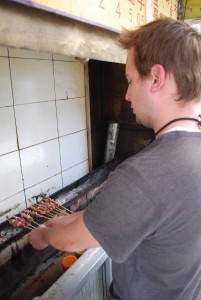
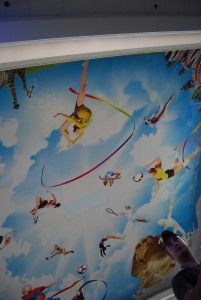
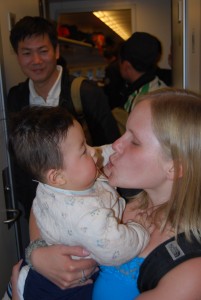
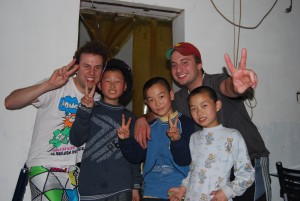
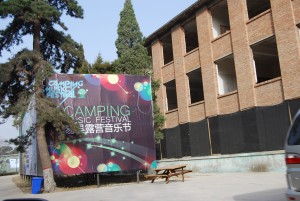

Leave a comment: